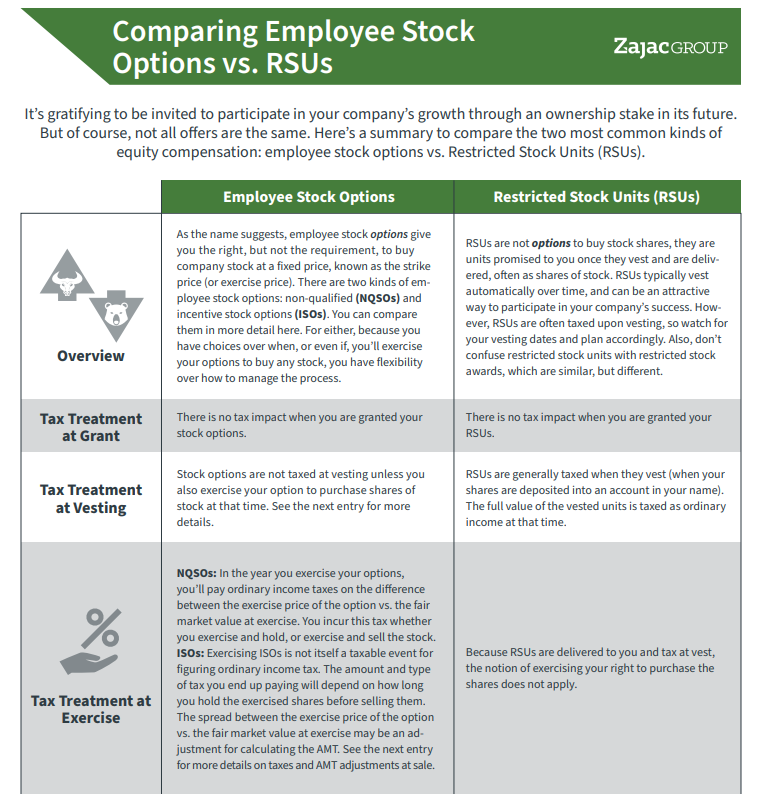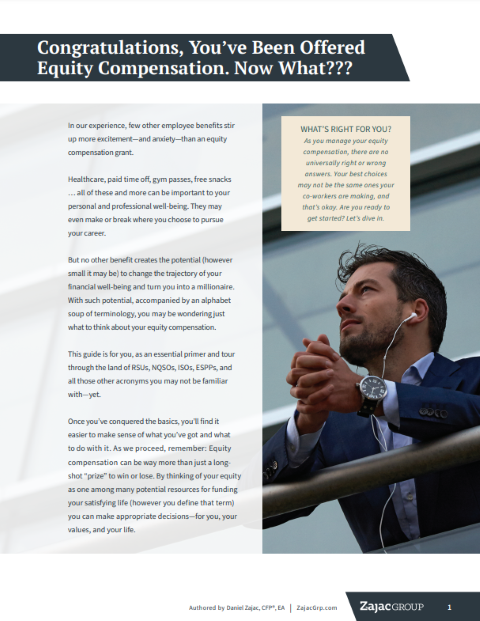If your employer offers restricted stock units (RSUs) as a form of equity compensation, you likely have questions about managing it effectively alongside the other pieces of your financial picture. The good news is, RSUs are relatively simple with fewer options than other types of equity comp. That being said, you will still need to be cognizant of when they vest, how they can impact your tax bill, and when may be the best time to sell or hold shares.
Here is our in-depth introduction to the basics of restricted stock units.
What Are Restricted Stock Units (RSUs)?
RSUs are a type of equity compensation that gives employees the contractual right to receive shares of stock (or the cash equivalent value) at some time in the future, once certain conditions are met.
RSUs are often subject to a vesting schedule, which must be satisfied before shares are delivered to the employee.
Often, the vesting schedule is “time-based,” meaning the employee will receive the shares once they’ve been with the company for the required period of time (as determined by the vesting schedule).
A vesting schedule may look something like this: 25% of your RSUs will vest 1 year from the grant date. The remaining units will then vest quarterly over the next 12 periods.
COMPARISON GUIDE
Not All Stock Offers are the Same! Here's a helpful comparison between two of the most common employee stock options.
RSUs do not represent immediate ownership of stock—rather, they’re a promise of the receipt of an unknown future value tied to the stock price of the company, once all conditions have been met.
How Are RSUs Valued?
RSUs are referred to as “full value awards” because—assuming the value of the stock is above zero—they will always be worth something. This is different than other types of equity compensation, like non qualified and incentive stock options, which are only valuable if the fair market value (FMV) of the stock exceeds the strike price of the option (the price at which you can exercise your option to buy stock).
You can determine the grant value of a newly issued RSUs by multiplying the number of units granted by the FMV of your company’s stock on the grant date.
For example, if you’re granted 5,000 RSUs and the FMV is $50 per share, the total value of your RSUs at grant is:
5,000 x $50 = $250,000
(# of units) x (FMV) = (Total value of RSUs)
Note that the value you receive when the RSUs vest will likely be different than the grant price due to the increase or decrease in the stock price as of each vest date. In fact, different groups of RSUs will have different FMVs when they vest, depending on how the company stock is performing.
For example, reviewing the schedule below, a hypothetical grant could have 13 vest dates over 4 years.
| Vest Period | Hypo Vest Date | Vested | Share Price on Vest Date |
| 1 | 1/1/2026 | 1,250 | TBD |
| 2 | 4/1/2026 | 312 | TBD |
| 3 | 7/1/2026 | 313 | TBD |
| 4 | 10/1/2026 | 312 | TBD |
| 5 | 1/1/2027 | 313 | TBD |
| 6 | 4/1/2027 | 312 | TBD |
| 7 | 7/1/2027 | 313 | TBD |
| 8 | 10/1/2027 | 312 | TBD |
| 9 | 1/1/2028 | 313 | TBD |
| 10 | 4/1/2028 | 312 | TBD |
| 11 | 7/1/2028 | 313 | TBD |
| 12 | 10/1/2028 | 312 | TBD |
| 13 | 1/1/2029 | 313 | TBD |
But remember, as long as the stock price doesn’t drop to zero and you meet the vesting requirements, there is some value to be had.
Taxes and Portfolio Concentration: The Importance of Managing Your RSUs
RSUs are relatively simple to manage when compared to employees stock options. However, that doesn’t mean you can let your RSUs vest without paying attention. By doing nothing, you will likely begin to accumulate shares of stock, potentially resulting in single stock concentration. This may lead to an inappropriate amount of risk within your portfolio, leaving you overexposed to the ups and downs of a single company’s performance.
To properly manage the tax liability and strategize how your RSUs will play a role in your portfolio, you’ll need to understand the full lifecycle of your RSUs.
Understanding the Lifecycle of an RSU
Let’s walkthrough the lifecycle of an RSU, based on the actions you may need to take at different stages:
Accept or receive the RSU grant
Some companies will require employees to “accept” the grant, meaning they must agree to receive equity compensation in the form of RSUs. Once the grant is accepted, the vesting period begins.
Receive your vested units
Once the vesting period has ended and all criteria have been met, you will be entitled to your shares of company stock. Your company will often withhold a certain number of units to cover the tax required to be paid at vest, and the remaining units will be deposited as shares of stock into a brokerage account (assuming you are a public company). After the shares hit your account, you’re free to hold or sell as you please (barring any IPO-related lock-up periods, blackout periods, or other restrictions).
Calculate your potential tax bill
While your company will withhold some units for taxes, it may not be enough to cover the total tax due.
The standard federal statutory withholding rate is 22% (or 37% for supplemental income over one million dollars). If you’re in the highest tax bracket (which in 2025 is 37% and applies to married filers with an adjusted gross income above $751,600 (or $626,350 for single filers) relying solely on the standard withholding to address the tax liability of your vested RSUs may not be sufficient.
You may want to work with an advisor or tax professional to run a tax projection on your vested units. If you believe you’ll likely owe more at tax time, make a plan for addressing the additional tax liability. You may need to make estimated tax payments throughout the year, sell additional shares to cover the bill, or pull capital from other sources.
Decide when to sell
Once the shares are in your possession, you have an important decision to make—hold or sell?
Here are a few things to consider:
- RSUs are Taxed the Same as Compensation: Income earned from vesting RSUs is taxed the same as other wages or bonus income, even though this income is delivered as shares of stock. Therefore, it is reasonable to suggest that immediately selling your RSU shares at vest, and redirecting the total proceeds into another investment may makes sense.
- Value of the stock: If you hold the shares past vest, you will owe capital gains tax on any profit earned from selling the stock. Capital gain (or loss) would be the difference between the FMV of the stock at the time it vested and the time it was sold. If a share vested at $50 a share and sold for $80, you would owe tax on the $30/share profit.
- Short-term vs. long-term capital gains: If you hold your shares for longer than a year post-vest, your profits will be subject to the long-term capital gains tax rate, which ranges from 0-20% in 2025. But if the shares are held for less than a year, the profit is subject to short-term capital gains tax, which mirrors your ordinary income tax rate (with a maximum rate of 37%).
- Concentration: Holding shares beyond the vesting date may also lead to single stock concentration or exacerbate an already concentrated position, of which you want to be mindful.
Remember, taking no action on your vested RSUs is still action, and not necessarily the one you want to take.
Learn more about the lifecycle of an RSU here.
How Are RSUs Taxed?
RSUs are taxed when they vest and are delivered. The full value of the units is considered compensation income and subject to the same federal taxes as your salary including ordinary income tax, Social Security tax, and Medicare tax. This amount will appear on your W-2 you receive at year end.
Your company will often withhold enough units to cover a 22% tax rate when they vest, but this may not be enough to meet your full tax liability (especially if you’re a highly compensated employee in a higher tax bracket).
A second reportable tax event will occur when you sell your vested and delivered shares. If you sell the shares immediately upon vesting, the tax impact will be likely be minimal (but still reportable on your tax return). If you hold the shares beyond vest, you’ll likely need to pay capital gains (or losses) tax as well—either long- or short-term capital gains tax rates depending on how long you’ve held the shares before selling.
The proceeds of the sale of shares received from RSUs will be reported on your brokerage firm’s 1099-B. It is important to note that the cost basis information for the sale is often not reported or not reported correctly, requiring you to make an adjustment to the cost basis so you don’t over-pay on your tax. You should work with a tax advisor who is familiar with RSUs.
While this all sounds simple enough, the tax situation surrounding RSUs can get complicated as your shares accumulate and grow—or if you’re managing other types of equity comp at the same time.
Read more about the tax impact of your RSUs here.
What Happens to My RSUs if I Leave My Job?
If your RSUs have already vested by the time you leave your job, they’re yours to keep or sell as you wish. Remember, in most cases RSUs will be automatically added to a brokerage account once fully vested.
But if you have unvested RSUs and leave your company, they will likely be forfeited.
That being said, there may be some exceptions. For example, if you work for a company and leave due retirement, death, disability, or due to a family emergency or a health issue, your employer may be willing to offer you a post-termination grace period (or another alternative, like speeding up the vesting schedule). You’ll need to review your plan documents to see how leaving your job impacts your RSUs.
RSUs vs. Stock Options
Remember, RSUs do not give employees the option to purchase stock from the employer. Rather, they’re the promise that in the future, the company will distribute to the employee shares of stock. Every dollar a vested share of RSU is worth counts as taxable income for the employee, since the employee did not have to pay for such shares.
By comparison an employee stock option gives employees the option to purchase shares of company stock at a set price (called the strike or exercise price). The employee is not obligated to make a purchase, but they retain control over when (or if) they will exercise their options after the vesting period has ended and buy stock.
Unlike RSUs, stock options are not subject to tax when they vest. Rather there is a reportable tax event when you exercise and/or sell, depending on a few factors.
Learn more about the difference between RSUs and stock options here.
RSUs vs. RSAs
Restricted stock awards (RSAs) are similar to the restricted stock units we’ve been referencing so far with a few key differences.
As you might recall, RSUs are the promise that in the future, once the vesting period has ended, you will be given a certain amount of company stock. Until then, however, you do not have actual ownership of the shares.
While RSAs are still subject to vesting periods, employees are granted actual company stock up front—though they cannot sell or do anything with it until the vesting period has ended. Just like RSUs, they will also forfeit their unvested shares if they leave the company.
During the vesting period, however, RSAs can earn dividends that are paid out to employees. They also give grant-holders (employees with unvested RSAs) voting rights, just as shareholders would have. Additionally, a Section 83(b) election is available for RSA but not for RSUs, as described further in the article referenced below.
Here’s an article that touches more on the difference between RSUs and RSAs.
RSUs vs. PSUs
While RSUs are often tied to a time-based metric, performance units (PSUs) vest based on a certain company performance metric. A PSU will still often include a timeline, during which the metric must be met for the shares to be awarded.
For example, a PSU grant might indicate that a company needs to reach its net revenue target within three years. If it does, the employee (usually a high-level executive) will receive the promised shares. If the company exceeds its target net revenue by a certain amount, the employee may receive even more shares—the opposite is true as well. Underperformance can lead to lower shares awarded.
Double-Trigger RSUs
Some RSUs, particularly those issued by private companies, may come with a double-trigger feature. Employees with double-trigger RSUs don’t receive ownership of the units until two criteria are met. First, the RSU grants must vest (usually on a time-based vesting schedule). The second trigger is usually a liquidity event like an acquisition or IPO.
Until the second trigger occurs, employees with fully vested RSUs will not have access to their units. However, a double-trigger feature can help employees better address their tax liability since a liquidity event often creates an opportunity to sell shares.
Read more about double-trigger RSUs here.
Have Questions About Your RSUs?
While RSUs may be considered a fairly simple form of equity compensation (compared to ISOs and NQSOs), they still require quite a bit of planning and preparation.
If you have questions about your RSUs, or you’d like to start making a gameplan for when they vest, we encourage you to reach out to our team today. We can schedule time to talk through your vesting schedule, tax concerns, and greater financial goals together.











0 Comments